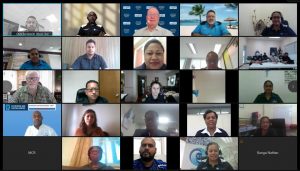Suva, Fiji, 14 February 2022: Over 100 officers from 16 countries are part of a regional effort to protect the Pacific from the economic, social, and health hazards of counterfeit items.
Last week, the United States Patent and Trademark Office (USPTO) and the Oceania Customs Organisation (OCO) started a six-week 1-hour training series that will help Customs officers improve their skills in detecting contrabands and fake products at the borders.

Customs officers attending the Intellectual Property Rights (IPR) Brand Protection and Product Identification training this week.
Customs enforcement officers, Customs intelligence officers, national intellectual property rights (IPR) contact points and Customs border officers are attending the virtual training on “Intellectual Property Rights (IPR) Brand Protection and Product Identification,” which started on 9 February and ends on 16 March.
The officers will learn the basics of identifying branded products and develop their skills in targeting and profiling suspicious products.
“Counterfeiting is a global challenge and millions of Pacific Islanders are at risk daily from counterfeit items that could cause economic, social, and health harms,” USPTO, Senior Counsellor Peter Fowler said. “During this pandemic, we have seen a rise in counterfeit items—even vaccines, masks, and sanitizers. Customs officers are the first line of defense at the borders, and it is important that they are equipped to distinguish fake products from genuine ones.”
OCO and the USPTO had earlier signed an agreement to develop IPR legislation for 14 selected OCO members: Federated States of Micronesia, Fiji, Kiribati, Marshall Islands, Niue, Nauru, Palau, Papua New Guinea, Samoa, Solomon Islands, Timor Leste, Tonga, Tuvalu, and Vanuatu.
The two organisations are working to ensure an IPR legislative framework is in place within the Customs administrations of the 14 selected members that is compatible with U.S. IPR legislation, the World Trade Organisation (WTO) agreement on Trade-Related Aspects of Intellectual Property Rights (TRIPs), and local practices.
“Customs plays a critical role to prevent counterfeit or pirated goods from entering communities or crossing the borders, but the challenge is striking the balance between regulating and facilitating trade and ensuring that the flow of genuine merchandise is not impeded,” OCO Head of Secretariat, Richard Brennan said. “This is an important training to develop the skills of our members, which is critical to their administrations and the Pacific region.”
For more information, queries or interview requests, please email MediaOCO@ocosec.org
About OCO: OCO is a grouping of 23 customs administrations in the Pacific region. It facilitates regional cooperation, information sharing and capacity building of its members with the overall target of supporting economic growth and improved border security in the Pacific.